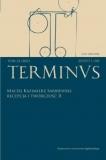Katon Macieja Kazimierza Sarbiewskiego (Lyr. II 6) i exercitia Seneciana
Maciej Kazimierz Sarbiewski’s Cato (Lyr. II 6) and exercitia Seneciana
Author(s): Iwona SłomakSubject(s): Poetry, Polish Literature, Theory of Literature
Published by: Wydawnictwo Uniwersytetu Jagiellońskiego
Keywords: Maciej Kazimierz Sarbiewski; odes II 6; II 5; II 7; Cato the Younger; reception of Seneca the Younger;
Summary/Abstract: The starting point for the research presented in this article was an attempt to trace the literary tradition which inspired the creation of the lyrical subject and the titular figure of Maciej Kazimierz Sarbiewski’s ode II 6 (Cato Politicus). The presence of this name implies that the intertextual dimension of the poem should be taken into account in its interpretation, hence, the author of this article assumed that the question of the literary tradition should be addressed before a hypothesis about the meaning of the poem is put forth. A review of Sarbiewski’s potential sources of inspiration – primarily works that were included in the basic and supplementary reading lists in Jesuit colleges – brings satisfactory results. It turns out that the ancient author who often mentions Cato the Younger is Seneca Philosophus, moreover, there are numerous similarities between some passages in his works and ode II 6. Sarbiewski seems to have been especially inspired by his Epistulae morales ad Lucilium, and also by the Senecan Consolationes. However, rather than refer to the views attributed by Seneca explicitly to Cato, the Polish poet explores the thoughts of the Philosopher himself, possibly assuming that the views of the politician and the philosopher were similar; this assumption could be justified by the fact that Seneca not only repeatedly expresses highest praise of the republican hero, but he also openly recommends to treat Cato Uticensis as a role model. These issues are discussed in the first part of this paper. In the second part, the author compares selected passages from Seneca’s works and two poems (II 5 and II 7) adjacent to the ode Cato Politicus. The comparison shows that the convergences discussed above are not incidental. On the contrary, there is a series of Sarbiewski’s odes inspired by Seneca, and therefore the Roman philosopher and tragedian can be considered the next, after Horace, master of the Jesuit poet. It is postulated that these inspirations deserve more recognition in further studies on Sarbiewski’s poetry, as they may be helpful in the interpretation of some problematic passages of his odes.
Journal: TERMINUS
- Issue Year: 23/2021
- Issue No: 1 (58)
- Page Range: 1-24
- Page Count: 24
- Language: Polish

